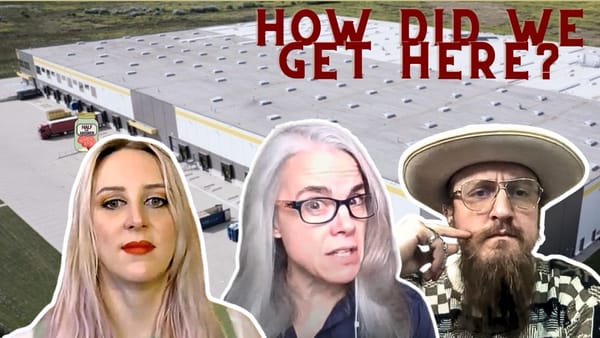Reforging America
A new order for America must involve a comprehensive reconstruction of our political, economic, and civic infrastructure.

The world that we knew is gone. Trump II is working to build a new order: an ugly order, defined by lawlessness, corruption, bullying abroad and racial and gender oppression at home. What is our alternative? I begin from a fact: the old order broke down for reasons. The world we grew up in was no longer fit for purpose; its contradictions had become unbearable.
We allowed the fundamental checks and balances of our political system to decay. Congress atrophied and government became a struggle between an overweening presidency and an overweening Court. Congress shrugged off more and more of its responsibilities, delegating the burden of making hard choices to presidential discretion or the arcane process of judicial review. This worked for a while... and now a lawless president is grasping at every lever of power in a search for absolute personal control.
We built an economy on artificial scarcity and asset appreciation. That made some people rich for a while... but now the ever-increasing cost of housing is crippling us. Wealth inequality gapes ever wider. Billionaires buy themselves de facto cabinet seats while ordinary Americans grapple with inflation.
Perhaps most deeply, our culture was riven by a deep hypocrisy. We were explicit that we were a land of free and equal citizens... while remaining in many ways a de facto white man's republic. Now that contradiction has come to a head, most visibly at the border, and the border itself has spread into every corner of our country and swallowed our rule of law.
To fix these problems we must do more than tweak a few things around the edges. We must fundamentally rebalance the economy to one in which jobs and wages are the foundation of your security, not your home equity. Making this happen will require an equally effective, muscular Congress to manage it. And this must be undergirded by a new cultural consensus that America is for everyone—not just the rich, the white, the male.
How can this be done?
The mainspring of governance
The atrophy of Congress as a governing body is at the heart of our current constitutional crisis. So what is to be done?
There will be the strong temptation to do nothing. If we kick out Trump II and elect a Democrat in 2028, there will be the strong temptation to simply continue the turn towards an ever-more-powerful executive, governing independently of a divided, sclerotic Congress. This would be a disaster. We built an imperial presidency, and then when a would-be emperor came along, all he had to do was pick up the tools we put there for him.
American Reconstruction means revitalizing Congress as the mainspring of American governance. This must include three fundamental components.
First, Congress must be revitalized internally. This first issue is most well-known. The 60-vote Senate was never intended by the Founders to be a chokepoint of all legislation. The filibuster must be abolished or substantially amended. Pay for legislators must be substantially increased, along with increased funding for legislative staff. Congress should not be dependent on lobbyists or the executive for analysis and information. If Congress is to hold the president to account, it must have resources behind it to match the president's.
Second, Congress must reassert itself vis-a-vis the other branches. This means cracking down on both our hubristic Court and our imperial presidency. The first can be achieved by expanding the Court substantially, while instituting mandatory 18 year terms for justices. In the long arc of American history, it is the justices' lifetime tenure more than anything else that has enabled them to amass such power. Impeaching every justice who has endorsed Trump's lawlessness would also do much to reassert Congress' power as a co-equal interpreter of the Constitution. And moving to a secret ballot for impeachment proceedings would do much to empower individual Senators to stand against the other branches.
The second must involve Congress clawing back the vast discretionary powers it has entrusted to the presidency. To take just one example, the 2001 Authorization for the Use of Military Force, which has formed the legal basis for the president's discretionary warmaking, must be repealed. Congress should increase the number of independent, professional agencies, on the model of the independent Federal Reserve.
Third, and most importantly, the link between the Congress and the people must be reforged. In today's age of gerrymandering and hyperpartisanship, far too many elected officials' true constituency is a tiny sliver of the primary electorate. And the votes of millions of Americans simply do not matter in general elections. To remedy these problems without the thorny knots of measuring gerrymandering, we should mandate multimember proportional elections for the House of Representatives. We should expand the Senate by adding new states, most especially Puerto Rico and the District of Columbia, and we should expand the House to match our growing population by repealing the Permanent Apportionment Act of 1929.
When Americans go to the polls, they should know their votes matter—and elected officials must know that they will be held accountable by all their constituents, based on the policies they deliver while in office. By making senators and members of Congress accountable to the mass of people, rather than their party's angriest partisans, we can force them to once again deliver material improvements to the general welfare, not applause lines and virtue signaling to their bases.
A world of abundance
Both right and left have increasingly retreated into zero-sum thinking, in which for some of us to have more others must have less. Such thinking is poison to a democratic republic, which is founded on the possibility of free exchange and mutual benefit. But if we want people to believe in a positive-sum world, we should start by delivering one—instead of our current dysfunctional economy of scarcity and inequality.
So what is to be done?
First, we must clear out regulations that serve only to create artificial scarcity. My prescriptions here will be somewhat boring if you are familiar with the YIMBY movement, or Abundance Liberalism, or any of the various flavors of this broader program. We must tear up the artificial barriers to housing. We must reform our zoning codes. We must reform our permitting laws. We must create environmental regulations fit for the 21st century—regulations that enable green energy and dense housing instead of blocking them. The to-do list is long.
Second, we must run a hotter economy than the neoliberals allowed. Wage growth drives technological advancement, as workers seek out better—more productive—jobs, and capital seeks out new technologies that enable us to make more from less. This is necessarily complemented by the attack on artificial scarcity. Running a hot economy that is still strangled by vetocracy just creates inflation—and nobody likes that.
Third, we should invest in basic public goods. Free markets and free exchange are built on a public foundation: research and development, public and higher education, infrastructure and health care. These basic goods do not inhibit economic freedom, but sustain it, by giving each citizen the capacity to engage in a modern economy on their own terms. These are essential to a thriving economy in the twenty-first century.
This will require revitalizing the civil service. Public goods require an effective, adaptive, well-funded and well-staffed bureaucracy to maintain them. We should stop subcontracting away our state capacity to corrupt or incompetent consultants, and start building the in-house expertise necessary to manage our twenty-seven trillion dollar economy.
Last, we should re-found the world trade system. Free trade internationally is foundational to modern prosperity—but only as long as that trade is also fair. The Communist Party of China built an enormous industrial sector by suppressing their own people's welfare while exporting those goods abroad; that industrial power now makes them a threat to every one of their neighbors. We shouldn't pretend this isn't a problem; we shouldn't pretend that an unrestricted regime of free trade enabled precisely this.
We should re-found the world trade system on an inherently balancing mechanism, such as Bancor, which enables mutual governance of international capital flows, while preventing nations from fundamentally imbalancing the world economy through unfair trade practices. We can all benefit from free trade—as long as other countries are also willing to let their own people become markets for our goods and not just engines for authoritarian ambitions.
This should go hand-in-hand with a larger re-founding of American foreign policy on genuinely liberal principles—but details of that proposal are beyond the scope of this essay.
America for all
Perhaps most deeply, we are faced with a cultural crisis—or, to speak more correctly, a religious crisis, a rupture in the American civic religion. Who is America for? I answer: everybody. How can this idea win ascendancy in mass culture?
First, we must invest in public and higher education. Conservatives are obsessed with the conspiracy theory that woke Marxist professors are indoctrinating their children. They are wrong to think this is a conspiracy. But they are not wrong to tie it to education. Public education generally and higher education specifically exposes children to diversity. They live and learn alongside a diverse group of other people and discover that they are all, in fact, just people—not some scary amorphous Other coming to destroy America, but people.
Yet over the last thirty years we have allowed our education system to bleed out from a thousand cuts. State funding for state and community colleges has collapsed. We subsidize demand through generous loan programs—which are consumed by the rising price of scarce seats at elite colleges. We must spend more on public education, crack down on bizarre religious cults masquerading as "home schooling," and focus on supply-side expansions of higher education, like expanded state college systems.
Second, we must finally arrive at a new settlement on immigration. The current system is neither the exclusionary keep-America-white system longed for by the right, nor a humane and open system preferred by the left. Instead we have an awful muddle that suits no one, in which millions of people enter America—but only via a pointlessly torturous process that itself drives mass illegal immigration. The process to immigrate to America and become a citizen is torturous even via the easiest routes, such as a spousal green card.
We must face facts. Immigration is good for America. Immigrants come to America today for the same reasons immigrants ever have: because this is a free country where the streets are paved with gold. Immigrants come to America, work hard, pay taxes, create jobs, and generally become—Americans. We should make it easy and straightforward for hard-working law-abiding freedom-loving people the world over to immigrate. And in so doing, we will free up resources to use finding and prosecuting that small fraction of people who come here for less savory reasons.
In doing this, we must abolish the Constitution-free zone we have created on the border, and which has now spread itself like mold across all of America. Even illegal aliens must be given due process—this is the only way to guarantee due process to citizens, as we are seeing clearly now.
Third, we must prosecute all the criminals of Trump II. Aggressively. Federal officials flouting the Constitution, ICE goons ignoring court orders, white-shoe law firms committing flagrant bribery—all of them. We must go after not just foot soldiers but ringleaders—elites. Prosecution serves a deterrent effect. Prosecution gets criminals off the streets and prevents them from doing further mischief. And, perhaps even more fundamentally, prosecution sends a message. This is not who we are. This is not what America is.
Fourth, we must rebuild our public sphere. Culture is built on shared norms, shared values—and shared facts. Honest journalism and local reporting are foundational to a free society. These institutions have been decimated by tech titans and the social media age. We should recognize the public value of such institutions, by creating an independent federal agency to provide substantial subsidies to local reporting, honest journalism, and civic associations. The truth matters.
American Reconstruction
In retrospect, Joseph Biden's presidency must been seen as a failure. There were many policy successes: but in his fundamental goal of repudiating and breaking Trumpism, he failed. In large part this is because he—and the Democratic Party generally—attempted to "muddle through" without fixing the fundamental problems that brought us Trump. Today it is clear that that option is no longer before us. There are deep and genuine problems in America. The contradictions of the Long 90s have come to a head.
If we are to build a new America fit for the 21st century, we must reforge our institutions. A new order must involve a comprehensive reconstruction of our political, economic, and civic infrastructure. These are not separate and independent policy silos, but a mutually reinforcing whole. Functional government. Prosperity for all. And America enough for everyone. This is a program for American Reconstruction.
It is time to swing for the fences.
Featured image is "[Columbia standing on the earth, holding an American flag and trademark sign]," artist unknown, circa 1890. Cropped.





